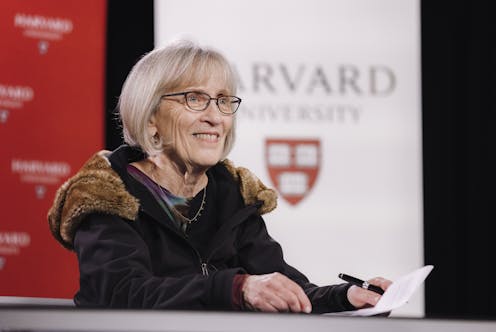Claudia Goldin’s Nobel Prize win is a victory for women in economics − and the field as a whole
- Written by Veronika Dolar, Associate Professor of Economics, SUNY Old Westbury

Economic history has long been chronicled through a male lens, emphasizing the contributions of men and their viewpoints. For proof, just look to the Nobel Memorial Prize in Economic Sciences. It’s been awarded to 90 men since 1969 – and just three women[1].
The third woman to win the prize, distinguished Harvard labor economist Claudia Goldin[2], was honored on Oct. 9, 2023, for her decades of work studying the gender pay gap[3]. It wasn’t a victory just for her but for women in the field.
As an economist[4], I take this issue personally. My field has a huge gender gap[5]. Only 24% of tenure-track faculty in economics are women. In contrast, women make up 43% of tenure-track faculty across academia as a whole.
More than just stocks and bonds
Part of the problem is that economics is often stereotypically associated with finance, money and banking. This narrow perception might not appeal to everyone. Women in particular tend to be drawn to areas that have direct bearing on social challenges[6].
But economics is about much more than just the stock market. In fact, vast areas of the discipline deal with social issues – health[7], development[8], education[9] and, yes, gender inequality[10].
For instance, labor economists study issues like family leave policies[11] and the gender pay gap[12] – areas that directly affect women’s lives.
It shouldn’t come as a surprise, then, that women have had a greater presence in labor economics than in other subfields.
Women have also historically been drawn to health economics, development economics and education economics[13]. But those fields don’t get as much attention, and the public sometimes doesn’t even recognize them as being part of economics at all.
They may even get the short shrift in Econ 101. A study of introductory economics textbooks found that 75% of people named[14] in them were men. Women weren’t even equally represented in hypothetical examples.
Where are the women?
Not only are women underrepresented as economists, economics as a field has historically ignored the role women play in the economy. Even as the study of family economics gained traction in the 1970s, the pivotal roles of women were often sidelined[15].
Traditional models often oversimplified households’ decision-making processes and overlooked women’s contributions. This led economists to undervalue the unpaid labor women provided in households and perpetuate stereotypical gender roles in their analyses[16].
Goldin has challenged these traditional male-centric narratives. Through her groundbreaking research – particularly on wage inequalities and the “motherhood penalty[18]” – Goldin has turned the spotlight on women’s economic roles and challenges.
Her findings reveal the complexities of wage disparities, emphasizing issues like the challenges women face after childbirth. For instance, career interruptions such as maternity leave[19] or reduced work hours to care for children and other relatives can reduce women’s earnings and job prospects in the long term.
It’s vital to note that Goldin’s research doesn’t attribute the gender pay gap to employer discrimination. Instead, her insights advocate for the establishment of robust support systems.
Strengthening child care facilities, improving parental leave policies, offering workplace flexibility and otherwise bolstering policies that support families with kids can play a pivotal role in addressing the wage gap, her findings suggest. In the absence of such supports, women are bound to keep earning less than men after they become parents.
A win for one, a victory for many
Goldin’s Nobel recognition isn’t merely an honor for her individual achievements. It serves as a beacon for women in economics and academia as a whole.
First, her win challenges the historical gender imbalance in such prominent awards, signaling a long-overdue recognition for women’s contributions to economics. It provides hope for young female economists that their work can also achieve such renown.
Beyond this, her Nobel nod underscores a crucial point: Economics is a rich and complex discipline that goes beyond traditional monetary and financial issues. It’s about parenthood. It’s about child care. It’s about people’s struggles. It’s about social change.
In essence, Goldin’s win shows the world just how expansive, inclusive, diverse and interconnected the field really is. Economics isn’t just the dismal science[20]. It’s a human science.
References
- ^ just three women (apnews.com)
- ^ distinguished Harvard labor economist Claudia Goldin (www.reuters.com)
- ^ decades of work studying the gender pay gap (www.nobelprize.org)
- ^ As an economist (scholar.google.com)
- ^ a huge gender gap (theconversation.com)
- ^ direct bearing on social challenges (cepr.org)
- ^ health (theconversation.com)
- ^ development (theconversation.com)
- ^ education (theconversation.com)
- ^ gender inequality (theconversation.com)
- ^ family leave policies (www.nber.org)
- ^ gender pay gap (www.econlib.org)
- ^ health economics, development economics and education economics (www.nber.org)
- ^ 75% of people named (www.insidehighered.com)
- ^ were often sidelined (www.imf.org)
- ^ stereotypical gender roles in their analyses (www.nber.org)
- ^ Carlin Stiehl/Getty Images (www.gettyimages.com)
- ^ motherhood penalty (www.nber.org)
- ^ career interruptions such as maternity leave (scholar.harvard.edu)
- ^ the dismal science (en.wikipedia.org)







